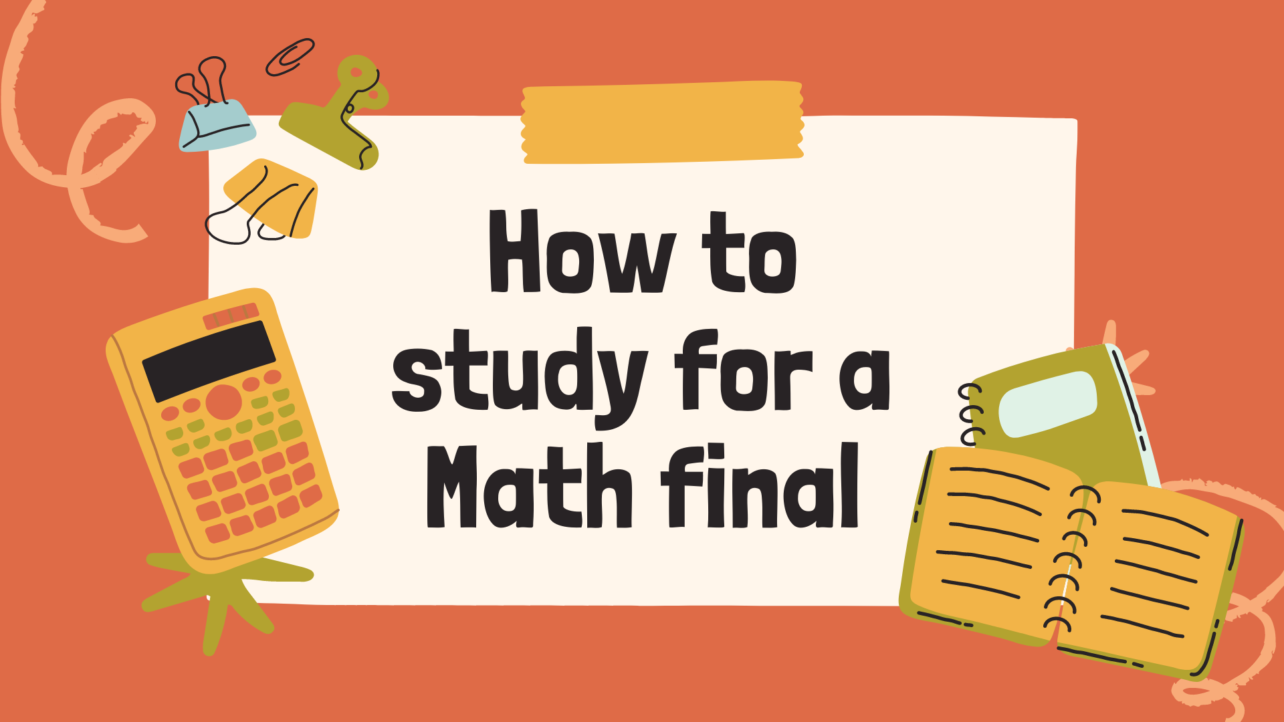Practice and do math exercises; that’s it!
Preparing for a math final can be daunting, but with the right approach, you can significantly boost your performance. Here’s how I managed to go from 8/20 in elementary school to 19.5/20 in high school on the math subject.
If you are studying for a math final exam, there may be two reasons why you are interested in reading this article: either there are still months until the final and you want to get yourself ahead, or you are on the deadline.
Long-Term Preparation
- Develop Active Recall Skills Start by implementing active recall techniques. Instead of passively reading your notes, actively engage with the material by trying to solve problems without looking at the solutions. This method can improve long-term retention by up to 50%, according to a study published in Science.
- Practice Regularly and Immediately After Learning Solve problems right after your lectures to capitalize on the primacy effect. A study in the Journal of Experimental Psychology found that immediate practice after learning can increase retention by up to 20%. This links to the next point about mastering problem-solving methodologies.
- Master Problem-Solving Methodologies Break down complex problems into smaller steps. This method, known as chunking, can improve your working memory capacity and help you tackle more challenging questions. As you practice, you’ll start recognizing patterns in problems, making future problem-solving easier.
- Visualize Problems Create visual representations of mathematical concepts. Research shows that students who use visual aids score 12-15% higher on problem-solving tasks. This technique connects well with the next strategy of seeking timely assistance when you’re stuck.
- Seek Timely Assistance Don’t hesitate to ask for help when you need it. A study by Stanford University found that students who sought help early in the semester achieved grades 10% higher than those who didn’t. This proactive approach ties into the next strategy of tackling past exams.
There are also some other good study techniques that can help you educate yourself better, like the test-teach-test method combined with the Feynman technique.
Short-Term Tactics
- Tackle Past Exams As your final approaches, practice with previous exam papers. This can boost your exam scores by up to 12%, according to a meta-analysis of 118 studies. This strategy naturally leads to the next point about intensifying your problem-solving practice.
- Intensify Problem-Solving Practice In the days leading up to your final, solve diverse problems. A study in the Journal of Educational Psychology found that varied practice leads to 40% better performance on new problems. This approach helps you prepare for unexpected questions in your final.
- Create Concise Summary Sheets As you review, condense key information into summary sheets. Students who create their own study guides retain 50% more information than those who don’t, according to research. These sheets will be invaluable during your final review sessions.
- Simulate Exam Conditions In the final days before your exam, take timed practice tests under conditions similar to the actual final. This can reduce test anxiety by up to 61%, helping you perform better under pressure.
The Night Before and Day of the Exam
- Review Your Summary Sheets Go through your concise summary sheets, focusing on key concepts and formulas. This last-minute review can help reinforce your memory.
- Get Adequate Sleep Prioritize sleep the night before your final. Students who get 8 hours of sleep score 10-15% higher on exams. A well-rested mind performs better in mathematical reasoning and problem-solving.
- Eat a Nutritious Meal On the day of your final, eat a balanced meal that includes proteins and complex carbohydrates. This can help maintain your energy and focus during the exam.
- Arrive Early and Stay Calm Get to your exam location early to avoid last-minute stress. Take deep breaths and remind yourself of your thorough preparation.
Additional Study Techniques
- Flashcards for Quick Reviews
- Create digital flashcards using apps like Anki for spaced repetition learning
- Focus on formulas, definitions, and key concepts
- Timed Practice Tests
- Simulate exam conditions to improve time management skills
- Analyze your performance to identify areas needing more attention
- Mind Mapping for Concept Connections
- Use tools like MindMeister to create visual representations of mathematical relationships
- This helps in understanding how different topics interconnect
- Regular Study Breaks
- Use the Pomodoro Technique: 25 minutes of focused study followed by a 5-minute break
- This helps maintain concentration and prevent burnout
- Maintain a Healthy Lifestyle
- Ensure adequate sleep (7-9 hours) before the exam
- Stay hydrated and eat brain-boosting foods like nuts and berries
The Power of Consistent Practice
Remember, the key to mastering mathematics lies in consistent, deliberate practice. As neuroscientist Dr. Andrew Huberman notes, “Repetition is the mother of learning.” By applying these strategies consistently, you can develop a deep understanding of mathematical concepts and improve your problem-solving skills significantly.
A study published in the Journal of Educational Psychology found that students who engaged in regular, spaced practice performed 13% better on math exams compared to those who crammed (Rohrer & Taylor, 2006).
Overall, practicing is what matters most. Practice, practice, practice! With it, you can develop very solid knowledge, not just for a math final but for everything you try in general. I wish you good luck in your final exam!

No comments yet